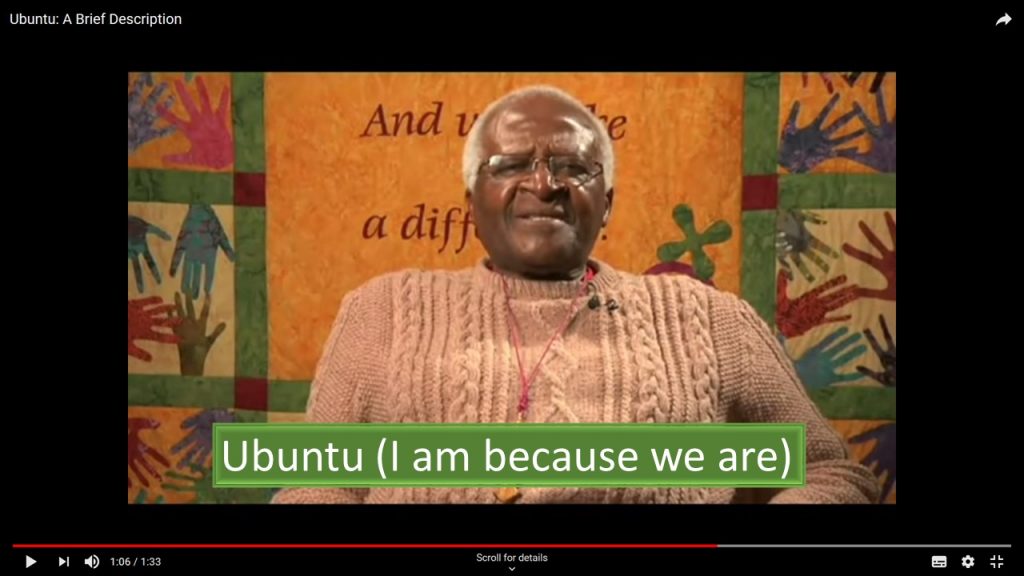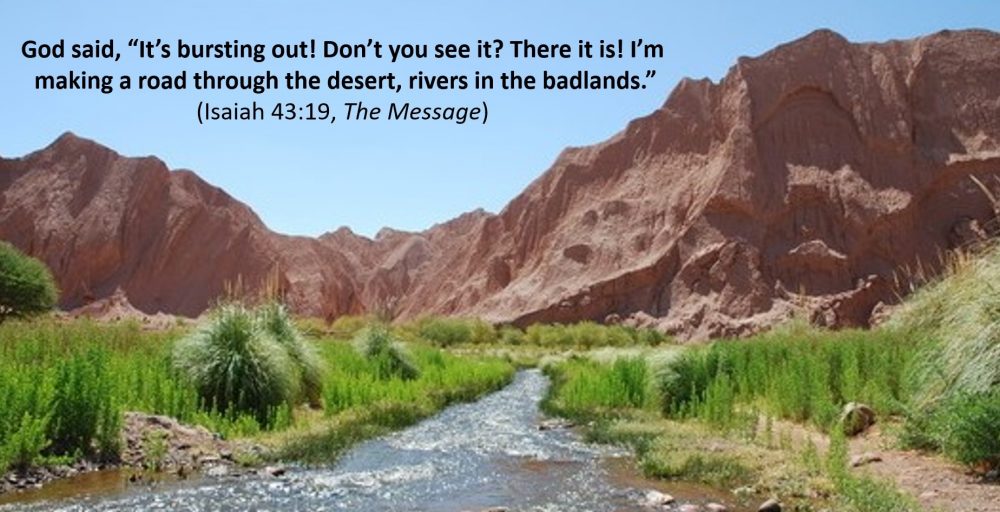
(This blog is also available as a video on YouTube at https://youtu.be/q9RXAnfC2Mk.)
Hello! I want to talk with you about the meaning of one of my favourite words. It is one of three favourite words of mine from languages other than English. One is from the Hebrew of the Old Testament, another is from the Greek of the New Testament and the third is from the language of the Xhosa people of southern Africa. (You may be able to guess what the first two are. If you can’t, I will tell you at the end of this chat.)
The one I want to focus upon for now is the third. It is the word ‘ubuntu’ and it is usually rendered in English as ‘I am because we are’. Desmond Tutu says this:
“Ubuntu … speaks to the very essence of being human, saying my humanity is caaught up, is inextricably bound up, in yours. We belong in a bundle of life and so we say in our part of the world a person is a person through other persons. It says not: I think therefore I am. It says rather: I am human because I belong, I participate, I share.”
As we all walk in the valley of the shadow of the coronavirus, are we not coming to realise in a new and deeper way that we are all one, that I am because we are? Again, Desmond Tutu talks of ubuntu as the spirituality of humanity’s oneness with our Creator, oneness with the other of another person and oneness with nature, with the physical world. And he goes on to say, “I dream of a new world and a new humanity, a humanity that expresses ubuntu”.
But this is not an idea that is peculiar to the Xhosa people from whose language the word comes or indeed to the people of Africa in general. Is it not an idea that runs right through the Old and New Testaments? We are made in the image of God, made for relationship with him and with one another, physical beings made of the dust of the earth, beings who are charged to care for creation, this physical world of which we are part.
In a poem that begins “No man is an island”, the English poet John Donne writes:
“Any man’s death diminishes me,
Because I am involved in mankind,
And therefore never send to know for whom the bell tolls;
It tolls for thee.”
The funeral bell tolls for each and all of us. The death of any fellow human being diminishes us. Jesus wept at the tomb of his friend Lazarus! He knew this diminishing at that moment. Are we not coming to know this diminishing in a new and deeper way in these days as we see on the screen pictures of those whom the coronavirus has taken from us?!
At the heart of it all is love, love for one another, love for the wonderful world in which we find ourselves, love for God who is love.
Desmond Tutu says ubuntu is very different from the individualism of the ‘Cogito ergo sum’, the ‘I think therefore I am’ philosophy that is so dominant in western thinking. He says that I am because we are, not I am because I think.
Back in the nineties, there was an international conference of Christian theologians in Kingston, Jamaica, who met to consider what it is to be a human being.[1] One task given to the delegates was to come up with a Christian alternative to ‘I think therefore I am’. They decided that love should be at the heart of it. (After all, if we value the capacity to reason above the capacity for love, we are saying that those with multiple learning disabilities or those with dementia are less human.) So they considered ‘I love, therefore I am’ as a possible Christian alternative. However, they quickly realised that, as the Bible says in I John 4:19, “We love because he first loved us” so they moved on to ‘I am loved, therefore I am’? But that is still focussed on the lone individual. They closed, doubtless with the encouragement of African delegates, on ‘We are loved, therefore we are’. This is a rendering of the idea of ubuntu with an explicit reference to love which is anyway implicit in ‘I am because we are’.
So ubuntu is not individualistic and is therefore different from something that is deeply embedded in western thinking.
At the same time, ubuntu is not collectivist. It says that I am and it says that we are. It is not that the individual is all-important and the group isn’t. (Margaret Thatcher expressed that individualist view when she said that there is no such thing as society.) On the other hand, ubuntu is not saying that the group is all-important and that the individual doesn’t matter. Ubuntu is therefore different from, for example, a communist perspective in which the rights and freedom of the individual are devalued. It is not either the individual or the group – it is both the individual and the group! It is a third way, a view of community that is between the extremes of western individualism and communist and other forms of collectivism.
It is both the one and the many. Christians believe in the Trinity of three Persons and one God. Some say it has to be one or the other, either one god or three divine persons, but Christians say it is both. In the same way, ubuntu is an idea of community that values both the individual and the group.
I hope you can see why ubuntu has become one of my favourite words. With Desmond Tutu, I dream of a new world and a new humanity, a world of ubuntu. Is that not the world of what the Bible calls “the promised new heavens and the promised new earth, all landscaped with righteousness” (1 Peter 3:13, The Message), the world of the now-and-not-yet kingdom of God?
The other two favourite words of mine from languages other than English? Have you guessed? They are shalom and agape. Perhaps we can come back to one or both of them later. Let us pray.
O God, Father, Son and Holy Spirit, help us all to promote true community wherever you have placed us, especially at this time as we are all seeking to cope with the impact of a global pandemic. Help us to care for the world, to love others and to love you for you have first loved us. Amen.
(This blog is also available as a video on YouTube at https://youtu.be/q9RXAnfC2Mk.)
P.S. If you would like to be notified when new blogs are posted, please EITHER (1) email me through the contact address on this website OR (2) message me if you have come here via a link posted on Facebook.
[1] See conference papers and report in a special issue of Transformation: An International Journal of Holistic Mission Studies, 15:1, January 1998.

Pingback: Welcome the Stranger | Rivers in the Badlands
Pingback: Welcome the Stranger | A website for those who teach